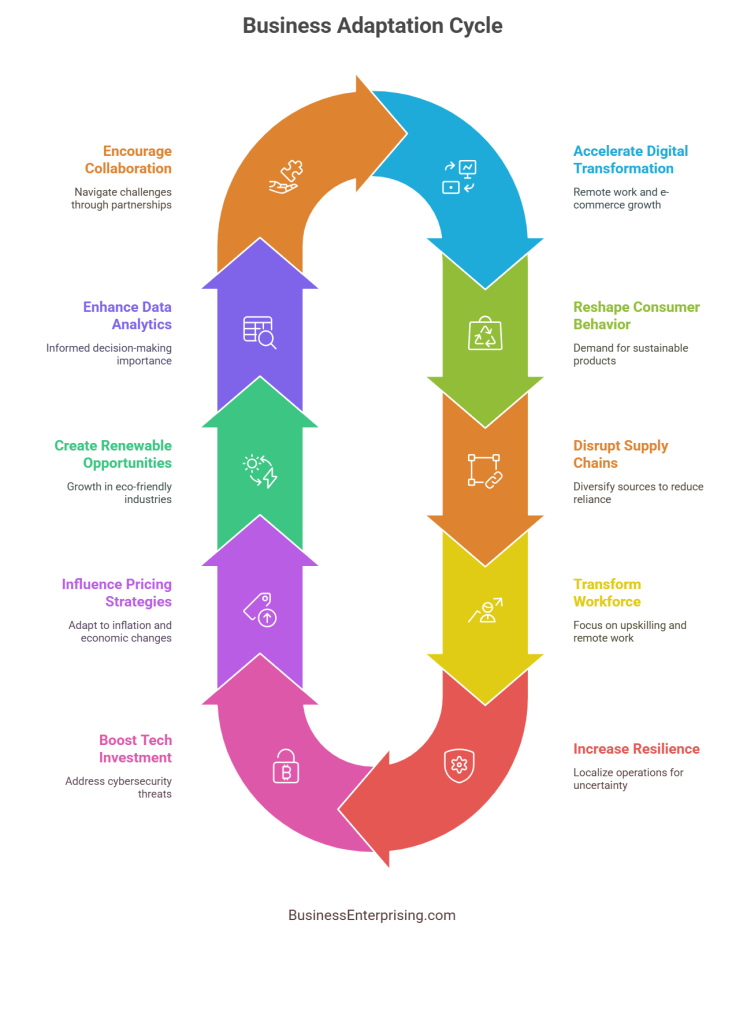 Global events are reshaping the way businesses operate, adapt, and grow. From economic uncertainty to technological advancements, change is constant. These events force you to rethink traditional strategies and find innovative ways to stay competitive. Understanding how global events are shaping business can help you prepare for challenges and seize new opportunities.
Global events are reshaping the way businesses operate, adapt, and grow. From economic uncertainty to technological advancements, change is constant. These events force you to rethink traditional strategies and find innovative ways to stay competitive. Understanding how global events are shaping business can help you prepare for challenges and seize new opportunities.
Additionally, shifts in consumer behavior, workforce dynamics, and sustainability priorities are driving businesses to evolve. Many companies are adopting digital tools, diversifying supply chains, or focusing on eco-friendly practices to meet changing demands. However, these adjustments require careful planning and a willingness to embrace new approaches. Staying flexible is essential in navigating this complex environment.
The ability to adapt has become a defining factor in business success. By exploring how global events influence industries, you can identify trends and plan effectively. Preparing for ongoing disruptions will strengthen your position and allow your business to thrive in an unpredictable world. Adapting to these changes is not just about survival but about creating long-term growth and resilience.
The Impact of Geopolitical Conflicts on Global Supply Chains
Geopolitical conflicts are significantly affecting global supply chains, causing trade disruptions and logistical challenges for businesses around the world. Sanctions and trade restrictions are limiting access to raw materials, forcing businesses to seek alternative suppliers. Additionally, delays at ports and border crossings have increased, leading to extended delivery times and higher costs. These challenges highlight how global events are shaping business operations and forcing companies to adapt quickly.
Furthermore, geopolitical tensions often result in unpredictable policy changes. Businesses must stay informed about shifting regulations to avoid disruptions. For example, sudden embargoes or tariffs can alter pricing structures, impacting profitability. Therefore, many businesses are reevaluating their reliance on single suppliers or specific regions. Diversifying supply chains has become a common strategy to reduce risks tied to geopolitical uncertainty.
The effects of these conflicts extend to inventory management as well. Many companies are building larger stockpiles to prepare for potential shortages. However, this approach also increases storage costs and ties up capital. Balancing these trade-offs requires careful planning and flexibility. Additionally, some industries face challenges that cannot be mitigated quickly, such as limited access to essential components.
Geopolitical conflicts demonstrate the interconnected nature of modern supply chains. As these events evolve, businesses must remain agile and adaptable to navigate disruptions. By understanding how global events are shaping business logistics, you can better prepare for future uncertainties. Taking proactive steps now can help protect your operations from further impacts.
Economic Trends Emerging from Global Events
Global events are significantly influencing economic trends, creating ripple effects that impact businesses and industries worldwide. Inflation has become a key concern, as disruptions to supply chains and rising energy costs drive prices higher. These increases reduce consumer purchasing power, which can affect your sales and profitability. Therefore, businesses must adapt pricing strategies and focus on maintaining value for customers.
Recession risks are another major trend emerging from global events. Economic uncertainty often leads to reduced investment and cautious spending. This impacts business growth and job creation. Additionally, central banks may tighten monetary policies to curb inflation, which can slow economic recovery. As a result, you may need to prepare for reduced demand and carefully manage your operating costs.
Market volatility is also reshaping how businesses operate and plan for the future. Fluctuations in currency values, commodities, and equity markets add layers of complexity. These changes can influence pricing, supply contracts, and international trade. However, they also highlight the importance of building financial resilience. Diversifying revenue streams and monitoring market conditions can help you navigate these challenges.
These economic trends illustrate how global events are shaping business decisions and strategies. Adapting to inflation, recession risks, and market volatility requires proactive planning. By staying informed and flexible, you can better position your business to weather economic shifts and seize opportunities when conditions stabilize.
The Role of Technology in Responding to Global Challenges
Technology plays a critical role in helping businesses adapt to global challenges, such as pandemics, natural disasters, and cybersecurity threats. Digital transformation has accelerated as companies adopt tools to maintain operations and reach customers during disruptions. Remote work solutions, such as cloud platforms and collaboration tools, have become essential for sustaining productivity. Additionally, many businesses have implemented e-commerce platforms to ensure they can continue serving customers online.
Emerging technologies are also addressing challenges caused by natural disasters. For instance, predictive analytics and AI-powered tools help businesses assess risks and make informed decisions. These tools enable you to identify vulnerabilities and mitigate potential disruptions. Therefore, integrating technology into your operations can provide greater resilience and adaptability during crises.
Cybersecurity has also become a top priority as businesses face increasing threats. Cyberattacks can disrupt operations and compromise sensitive data. To address this, many companies are investing in advanced cybersecurity measures. Solutions such as encryption, threat detection systems, and employee training programs can help you protect your business from digital risks. However, staying vigilant and updating your systems regularly remains essential.
These examples demonstrate how global events are shaping business strategies through technology adoption. By leveraging technology, you can respond effectively to crises and build long-term resilience. Embracing innovation not only addresses immediate challenges but also positions your business for future opportunities. Adapting to a rapidly changing environment is possible when you use technology as a strategic tool.
Changing Consumer Behavior Due to Global Events
Global events are significantly altering consumer behavior, influencing how people make purchasing decisions and interact with businesses. Pandemics have shifted preferences toward online shopping, as many consumers prioritize convenience and safety. This trend has accelerated the demand for e-commerce platforms and home delivery services. Therefore, adapting your business to include digital options is increasingly important for meeting customer expectations.
Additionally, climate change is driving consumers to seek sustainable products and services. Many people now prioritize brands that demonstrate environmental responsibility and transparency. This shift creates opportunities for businesses that focus on renewable materials, energy-efficient products, or waste reduction initiatives. However, failing to address these preferences can impact your brand’s reputation and customer loyalty.
Economic uncertainty from global events also affects buying habits. Consumers may reduce discretionary spending and focus on essential goods and services. This change requires you to adapt your offerings to match new priorities. Businesses that provide value-driven products or flexible payment options can gain an advantage during these times. Additionally, monitoring trends in consumer demand can help you pivot effectively.
These changes in behavior illustrate how global events are shaping business strategies and creating new opportunities. Adapting to shifting preferences allows you to better connect with your audience and build long-term trust. By understanding these trends, your business can remain competitive and resilient in a rapidly evolving marketplace.
Global Events Driving Workforce Transformation
Global events are driving major transformations in the workforce, reshaping how businesses operate and attract talent. Remote work has become a lasting trend, accelerated by the pandemic and advancements in technology. Many employees now expect flexible work arrangements, which require you to invest in digital tools and rethink traditional office setups. Additionally, remote work has expanded hiring opportunities, allowing businesses to recruit talent globally.
However, talent shortages remain a challenge for many industries. Shifts in migration patterns and evolving skills requirements have made it harder to find qualified employees. Therefore, businesses are focusing more on upskilling and reskilling programs to address these gaps. Offering training opportunities not only helps you retain current employees but also strengthens your workforce’s capabilities. This shift highlights how global events are shaping business strategies around talent management.
Technological advancements are also changing workforce needs. Automation and artificial intelligence have created demand for new skills while reducing reliance on certain manual roles. Adapting to these changes requires careful planning and investment in employee development. Additionally, balancing automation with human-centered roles is critical to maintaining workplace efficiency and employee satisfaction.
These workforce transformations demonstrate the need for adaptability and forward-thinking strategies. Addressing remote work preferences, talent shortages, and upskilling needs ensures your business stays competitive. By embracing these changes, you can build a more resilient and future-ready workforce. Global events continue to influence how businesses operate, making workforce flexibility and innovation more important than ever.
Sustainability and Resilience in the Face of Global Challenges
Businesses are increasingly adopting sustainable practices to address environmental, social, and economic challenges driven by global events. These efforts often focus on reducing waste, conserving energy, and transitioning to renewable resources. By prioritizing sustainability, you can improve your operations while meeting growing consumer demand for environmentally friendly products. Additionally, sustainable practices can help you lower costs and mitigate risks related to resource shortages.
Social challenges, such as inequality and community impact, are also reshaping business strategies. Many companies are now investing in ethical sourcing, fair labor practices, and community development programs. These initiatives strengthen your brand reputation and foster loyalty among socially conscious consumers. However, integrating sustainability requires long-term planning and a commitment to meaningful change.
Economic resilience is another focus as businesses navigate disruptions caused by global events. Sustainable practices, such as localizing supply chains or diversifying revenue streams, can enhance your ability to adapt. Additionally, innovations in green technology are opening new opportunities for businesses to thrive in a changing market. These efforts demonstrate how global events are shaping business priorities and encouraging more resilient practices.
Sustainability and resilience go hand in hand, enabling you to build a stronger foundation for the future. By addressing environmental, social, and economic challenges, your business can remain competitive and relevant. Embracing sustainable practices positions your company to respond effectively to global challenges while driving long-term growth.
Conclusion
Global events continue to reshape the way businesses operate, adapt, and grow. These challenges drive changes across industries, requiring flexibility and innovation. Whether it’s through adopting technology, responding to consumer behavior, or building resilient supply chains, businesses are finding ways to adjust. Therefore, staying informed about how global events are shaping business can help you make smarter decisions.
Additionally, these events present both obstacles and opportunities. Companies that embrace sustainability, invest in upskilling, or rethink their strategies are better positioned to thrive in changing conditions. However, success depends on your ability to plan ahead and act decisively. Taking proactive steps can ensure your business remains competitive in a dynamic environment.
Global events will continue to influence industries in unexpected ways. By focusing on resilience and adaptability, you can prepare for future disruptions and take advantage of new opportunities. Understanding how global events are shaping business allows you to stay ahead and strengthen your company’s position. The ability to evolve with the world around you is key to long-term success.




